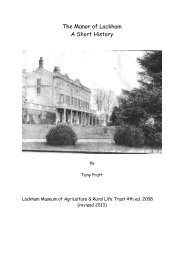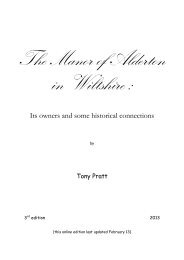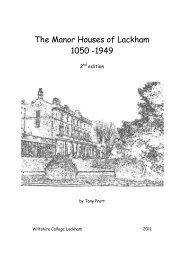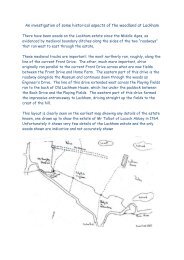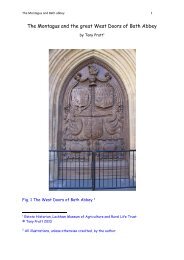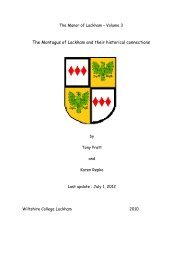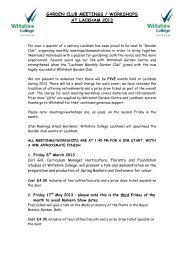History of Agricultural Education in Wiltshire - Lackham Countryside ...
History of Agricultural Education in Wiltshire - Lackham Countryside ...
History of Agricultural Education in Wiltshire - Lackham Countryside ...
You also want an ePaper? Increase the reach of your titles
YUMPU automatically turns print PDFs into web optimized ePapers that Google loves.
students, by Garden Societies and amateur groups visit<strong>in</strong>g the College. A further<br />
use <strong>of</strong> the material was as visual aids at meet<strong>in</strong>gs held throughout the county. In<br />
1975, the Local Government Tra<strong>in</strong><strong>in</strong>g Board's Tra<strong>in</strong><strong>in</strong>g Modules for the county<br />
grounds staff were <strong>of</strong>fered on a regular basis, occasional residential accommodation<br />
be<strong>in</strong>g available to those requir<strong>in</strong>g it. Domestic advice up to the late 1960's <strong>in</strong>cluded<br />
visits to gardens, but gradually this service was reduced to those few problems<br />
impossible to solve by telephone, letter or by the "client" visit<strong>in</strong>g the College by<br />
appo<strong>in</strong>tment. With the rise <strong>in</strong> <strong>in</strong>terest <strong>in</strong> domestic food production, there have been<br />
a very large number <strong>of</strong> soil and plant samples brought <strong>in</strong> for advice.[i]<br />
GROWTH OF DAY RELEASE IN HORTICULTURE<br />
In 1960/61, the U.E.I. Stage I Horticulture course was <strong>of</strong>fered at the Trowbridge<br />
College to six students. In 1962, this was changed to the City & Guilds <strong>of</strong> London<br />
Institute Stage I Horticulture syllabus with a class <strong>of</strong> eight students. The numbers<br />
<strong>in</strong> the Trowbridge recruit<strong>in</strong>g area stayed static <strong>in</strong> the region <strong>of</strong> 8 to 16, apart from<br />
1965 when there was a great <strong>in</strong>flux <strong>of</strong> school groundstaff for one w<strong>in</strong>ter period.<br />
Sw<strong>in</strong>don College and Salisbury College became centres <strong>in</strong> the mid 1960's with<br />
enrolments from the Parks Departments. Enrolment numbers reached a maximum <strong>in</strong><br />
1965 with over 50, but gradually slipped until the mid 1970's when numbers began to<br />
pick up after be<strong>in</strong>g at a steady 35 or so. By 1972, all the Horticulture Day Release<br />
classes were held at <strong>Lackham</strong> with a day for each area. Tuesday for South<br />
<strong>Wiltshire</strong>, Wednesday for the Warm<strong>in</strong>ster/ Trowbridge/Devizes area, Thursday for<br />
Sw<strong>in</strong>don and North <strong>Wiltshire</strong>. Enrolment numbers for 1976: Salisbury area 15, Mid<br />
<strong>Wiltshire</strong> 13, Sw<strong>in</strong>don area 14 (42).<br />
The careers <strong>of</strong>fice who undertook to provide the <strong>in</strong>formation relat<strong>in</strong>g to school<br />
leavers enter<strong>in</strong>g the <strong>in</strong>dustry have so far been unable to produce this latter statistic<br />
up to 1976, though they have been very helpful <strong>in</strong>deed with first job <strong>in</strong>formation.<br />
It is not clear if there has been a decl<strong>in</strong>e <strong>in</strong> numbers enter<strong>in</strong>g the horticultural<br />
<strong>in</strong>dustry. While there has been a 'shake out' <strong>of</strong> the staff at nurseries due to<br />
Selective Employment Tax, and the high overheads <strong>of</strong> employment such as the<br />
National Insurance Stamp contributions, there have been other areas <strong>of</strong><br />
development - both <strong>in</strong> some new glasshouse and shrub nurseries, more jobs at the<br />
Department <strong>of</strong> Environment (improv<strong>in</strong>g the horticultural amenities <strong>of</strong> the large area<br />
<strong>of</strong> Army camps, R.A.F. stations and the ancient monuments). Also the more<br />
pr<strong>of</strong>essional approach to school play<strong>in</strong>g fields and other Local Authority amenity<br />
ma<strong>in</strong>tenance has <strong>in</strong>creased the number <strong>of</strong> full-time appo<strong>in</strong>tments - maybe by reduc<strong>in</strong>g<br />
considerably the number <strong>of</strong> part-time personnel. Commercial horticulture has made a<br />
big sw<strong>in</strong>g to part-timers - ma<strong>in</strong>ly women, as their ma<strong>in</strong> labour source.<br />
The largest s<strong>in</strong>gle employer <strong>of</strong> groundstaff and horticulturists <strong>in</strong> the county, the<br />
Estates and Valuations Department, support tra<strong>in</strong><strong>in</strong>g courses, as do the Sw<strong>in</strong>don<br />
(Thamesdown) authorities with their own tra<strong>in</strong><strong>in</strong>g scheme, all with<strong>in</strong> the guide l<strong>in</strong>es <strong>of</strong>




